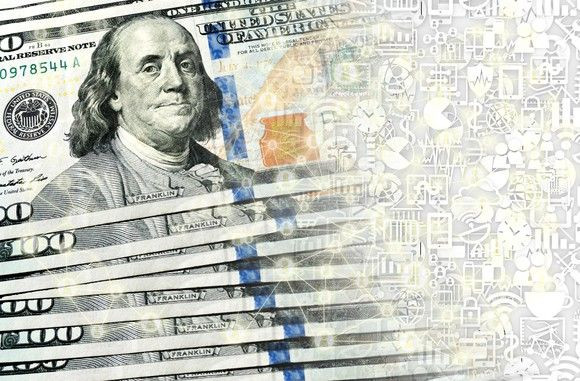Blockchain Could Restore Consumer Trust In These 3 Industries

This article originally appeared in the Motley Fool.
Though cryptocurrency valuations have taken center stage over the past year and change, it's blockchain technology that's been the primary driver of this incredible growth in virtual currency valuations.
Blockchain is the digital, distributed, and decentralized ledger that underpins most cryptocurrencies and is responsible for recording all transactions in a transparent and unchanging manner without the need for a financial intermediary. In short, it's a brand-new way to transmit money from one person or business to the next without using the current banking system.
The Advantages Of Blockchain Technology
Why would businesses or consumers consider switching away from traditional payment networks to use blockchain? To begin with, blockchain networks are decentralized, meaning transaction data isn't stored at a single data center. Instead, it's spread around the world on hard drives and servers, making it impossible for a single entity, including hackers, to gain control of a cryptocurrency or network.
Second, blockchain eliminates the need for banks to act as transaction middlemen. This is important, as it reduces the number of mouths to feed, so to speak, when a transaction is completed. The expectation is that cutting banks out of the equation could reduce transaction fees, which may be a boon for the consumer, business, or both.
Finally, the fact that validation and proofing of transactions is ongoing 24 hours a day, seven days a week may allow blockchain to process remittances in a fraction of the time as current banking networks. Whereas cross-border payments on today's networks can take up to five days to settle, blockchain networks may be able to settle those same transactions in real-time, or within a matter of seconds.
It's also worth pointing out that blockchain has non-currency applications, too, so don't pigeonhole this technology solely to the financial services industry.
Consumer Trust Issues Could Disappear In These Industries Thanks To Blockchain
What's perhaps most exciting about blockchain, aside from the advantages already described, is that it may offer the opportunity to dramatically improve consumer trust for a variety of industries. The immutable nature of blockchain, compounded with a slew of advantages, some of which were already mentioned, make it the perfect technology to improve consumer-industry relationships. Here are three such industries where current consumer trust issues could be swept aside if and when blockchain technology is implemented on a broad basis.
Diamond And Jewelry Industry
Though the issue has calmed over the past decade, I can speak firsthand from having worked in the jewelry industry in the mid-2000s that diamond sourcing was a serious consumer concern. The movie Blood Diamond, along with various documentaries and reports, played out how some African countries were fueling wars with money derived from the sale of diamonds. Consumers, knowing this, became more demanding of retailers to know where a diamond originated.
In 2000, the Kimberley Process was put into effect, and today it unites 81 countries in an effort to more transparently document the path of a diamond from its discovery to the jewelry store. Thanks to the Kimberley Process, the number of conflict-free diamonds is higher than where it was, say, one or two decades ago. But there's still room for improvement, and blockchain could be that vessel.
One of the more notable attributes of blockchain in the non-currency setting is as a tool to monitor and improve supply chains. By removing paper from the equation, blockchain can allow miners, cutters, wholesalers, and retailers to see where a diamond is in real time, as well as track its history with ease. Should a consumer ask to know the history of a particular diamond, blockchain's immutable record-keeping would allow this data to be pulled up immediately. If the goal is for 100% conflict-free diamonds, blockchain could help the jewelry industry get there.
Automotive Industry
The auto industry is also suffering from serious consumer trust issues. The past four years have been nothing short of a maelstrom for the industry, between safety recalls and scandals.
For example, in 2014, U.S. automakers recalled a record 63.95 million vehicles due to safety issues over more than 800 different campaigns. General Motors was behind 84 of those recall campaigns, totaling almost 27 million vehicles. In the following year, Volkswagen admitted that diesel-engine cars sold in the U.S. had software that was designed to trick emission tests into producing better results. Other overseas manufacturers have since been accused of cheating on emissions tests as well. These recalls and scandals certainly have consumers rethinking when they'll make their next vehicle purchase, and with which company. That's where blockchain could come in.
Last month, German automaker BMW (NASDAQOTH:BMWYY) announced a partnership with the VeChain Foundation to utilize the VeChain Thor blockchain to improve its business. While no specifics were given, there are two ways BMW could use blockchain to regain consumer trust, as BMW is among those automakers that have since been accused of cheating on emissions tests.
First, blockchain's transparency should allow for the real-time tracking of auto parts. This would help improve part order turnaround times, as well as reduce inefficiencies in BMW's parts supply chain, which should, in theory, be pinpointed much faster than with paper documents.
Second, and most importantly, BMW would be able to show consumers where car parts originated, and to provide a transparent and immutable log of all testing these parts underwent during the manufacturing process. If BMW can get consumers to feel confident about the quality of its parts by using blockchain, then this cutting-edge technology will be money well spent.

Banking Industry
And, of course, we can't forget about the banking industry, which is no stranger to losing consumer trust. Back in 2011, Bank of America, in search of new fees, tinkered with the idea of charging its members $5 a month to use their debit card. It didn't go over well.
Even more recently, a cross-selling scandal at Wells Fargo (NYSE:WFC) retail branches led to the creation of up to 3.5 million fake accounts, resulting in unauthorized fees and charges to unwitting bank customers. The banking industry definitely has a crisis of confidence on its hands that could diminish its ability to lure in new deposits and originate loans. Blockchain might be able to remedy this issue.
As noted, blockchain's immediate benefits are expected to be realized in the financial-services industry. Banks that implement blockchain technology have the opportunity to significantly expedite the validation and settlement time of remittances, which consumers could come to appreciate.
Just as important, the immutable nature of blockchain would allow consumers to keep a stranglehold on their finances, ensuring that no authorized accounts are opened, nor unauthorized withdrawals made. It's worth noting that Wells Fargo, among numerous large money-center banks, is internally developing and testing blockchain technology. Soon, with the help of blockchain, Wells Fargo may be able to put this dark spot in its otherwise illustrious history in the rearview mirror.
Sean Williams owns shares of Bank of America. The Motley Fool has no position in any of the stocks mentioned. The Motley Fool has a disclosure policy.




















